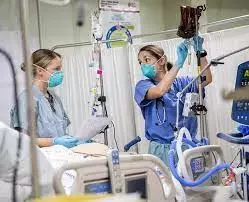- Home
- Medical news & Guidelines
- Anesthesiology
- Cardiology and CTVS
- Critical Care
- Dentistry
- Dermatology
- Diabetes and Endocrinology
- ENT
- Gastroenterology
- Medicine
- Nephrology
- Neurology
- Obstretics-Gynaecology
- Oncology
- Ophthalmology
- Orthopaedics
- Pediatrics-Neonatology
- Psychiatry
- Pulmonology
- Radiology
- Surgery
- Urology
- Laboratory Medicine
- Diet
- Nursing
- Paramedical
- Physiotherapy
- Health news
- Fact Check
- Bone Health Fact Check
- Brain Health Fact Check
- Cancer Related Fact Check
- Child Care Fact Check
- Dental and oral health fact check
- Diabetes and metabolic health fact check
- Diet and Nutrition Fact Check
- Eye and ENT Care Fact Check
- Fitness fact check
- Gut health fact check
- Heart health fact check
- Kidney health fact check
- Medical education fact check
- Men's health fact check
- Respiratory fact check
- Skin and hair care fact check
- Vaccine and Immunization fact check
- Women's health fact check
- AYUSH
- State News
- Andaman and Nicobar Islands
- Andhra Pradesh
- Arunachal Pradesh
- Assam
- Bihar
- Chandigarh
- Chattisgarh
- Dadra and Nagar Haveli
- Daman and Diu
- Delhi
- Goa
- Gujarat
- Haryana
- Himachal Pradesh
- Jammu & Kashmir
- Jharkhand
- Karnataka
- Kerala
- Ladakh
- Lakshadweep
- Madhya Pradesh
- Maharashtra
- Manipur
- Meghalaya
- Mizoram
- Nagaland
- Odisha
- Puducherry
- Punjab
- Rajasthan
- Sikkim
- Tamil Nadu
- Telangana
- Tripura
- Uttar Pradesh
- Uttrakhand
- West Bengal
- Medical Education
- Industry
Bacteremia from presumed urinary source in hospitalized patients with asymptomatic bacteriuria extremely rare: JAMA

Bacteremia from presumed urinary source in hospitalised patients with asymptomatic bacteriuria is extremely rare suggests a new study published in the JAMA.
Guidelines recommend withholding antibiotics in asymptomatic bacteriuria (ASB), including among patients with altered mental status (AMS) and no systemic signs of infection. However, ASB treatment remains common. A study was done to determine prevalence and factors associated with bacteremia from a presumed urinary source in inpatients with ASB with or without AMS and estimate antibiotics avoided if a 2% risk of bacteremia were used as a threshold to prompt empiric antibiotic treatment of ASB. This cohort study assessed patients hospitalized to nonintensive care with ASB (no immune compromise or concomitant infections) in 68 Michigan hospitals from July 1, 2017, to June 30, 2022. Data were analyzed from August 2022 to January 2023. The primary outcome was prevalence of bacteremia from a presumed urinary source (ie, positive blood culture with matching organisms within 3 days of urine culture). To determine factors associated with bacteremia, we used multivariable logistic regression models.
We estimated each patient’s risk of bacteremia and determined what percentage of patients empirically treated with antibiotics had less than 2% estimated risk of bacteremia. Results: Of 11 590 hospitalized patients with ASB (median [IQR] age, 78.2 [67.7-86.6] years; 8595 female patients [74.2%]; 2235 African American or Black patients [19.3%], 184 Hispanic patients [1.6%], and 8897 White patients [76.8%]), 8364 (72.2%) received antimicrobial treatment for UTI, and 161 (1.4%) had bacteremia from a presumed urinary source. Only 17 of 2126 patients with AMS but no systemic signs of infection (0.7%) developed bacteremia. On multivariable analysis, male sex (adjusted odds ratio [aOR], 1.45; 95% CI, 1.02-2.05), hypotension (aOR, 1.86; 95% CI, 1.18-2.93), 2 or more systemic inflammatory response criteria (aOR, 1.72; 95% CI, 1.21-2.46), urinary retention (aOR, 1.87; 95% CI, 1.18-2.96), fatigue (aOR, 1.53; 95% CI, 1.08-2.17), log of serum leukocytosis (aOR, 3.38; 95% CI, 2.48-4.61), and pyuria (aOR, 3.31; 95% CI, 2.10-5.21) were associated with bacteremia. No single factor was associated with more than 2% risk of bacteremia. If 2% or higher risk of bacteremia were used as a cutoff for empiric antibiotics, antibiotic exposure would have been avoided in 78.4% (6323 of 8064) of empirically treated patients with low risk of bacteremia. In patients with ASB, bacteremia from a presumed urinary source was rare, occurring in less than 1% of patients with AMS. A personalized, risk-based approach to empiric therapy could decrease unnecessary ASB treatment.
Reference:
Advani SD, Ratz D, Horowitz JK, et al. Bacteremia From a Presumed Urinary Source in Hospitalized Adults With Asymptomatic Bacteriuria. JAMA Netw Open. 2024;7(3):e242283. doi:10.1001/jamanetworkopen.2024.2283
Dr Kartikeya Kohli is an Internal Medicine Consultant at Sitaram Bhartia Hospital in Delhi with super speciality training in Nephrology. He has worked with various eminent hospitals like Indraprastha Apollo Hospital, Sir Gangaram Hospital. He holds an MBBS from Kasturba Medical College Manipal, DNB Internal Medicine, Post Graduate Diploma in Clinical Research and Business Development, Fellow DNB Nephrology, MRCP and ECFMG Certification. He has been closely associated with India Medical Association South Delhi Branch and Delhi Medical Association and has been organising continuing medical education programs on their behalf from time to time. Further he has been contributing medical articles for their newsletters as well. He is also associated with electronic media and TV for conduction and presentation of health programs. He has been associated with Medical Dialogues for last 3 years and contributing articles on regular basis.
Dr Kamal Kant Kohli-MBBS, DTCD- a chest specialist with more than 30 years of practice and a flair for writing clinical articles, Dr Kamal Kant Kohli joined Medical Dialogues as a Chief Editor of Medical News. Besides writing articles, as an editor, he proofreads and verifies all the medical content published on Medical Dialogues including those coming from journals, studies,medical conferences,guidelines etc. Email: drkohli@medicaldialogues.in. Contact no. 011-43720751


